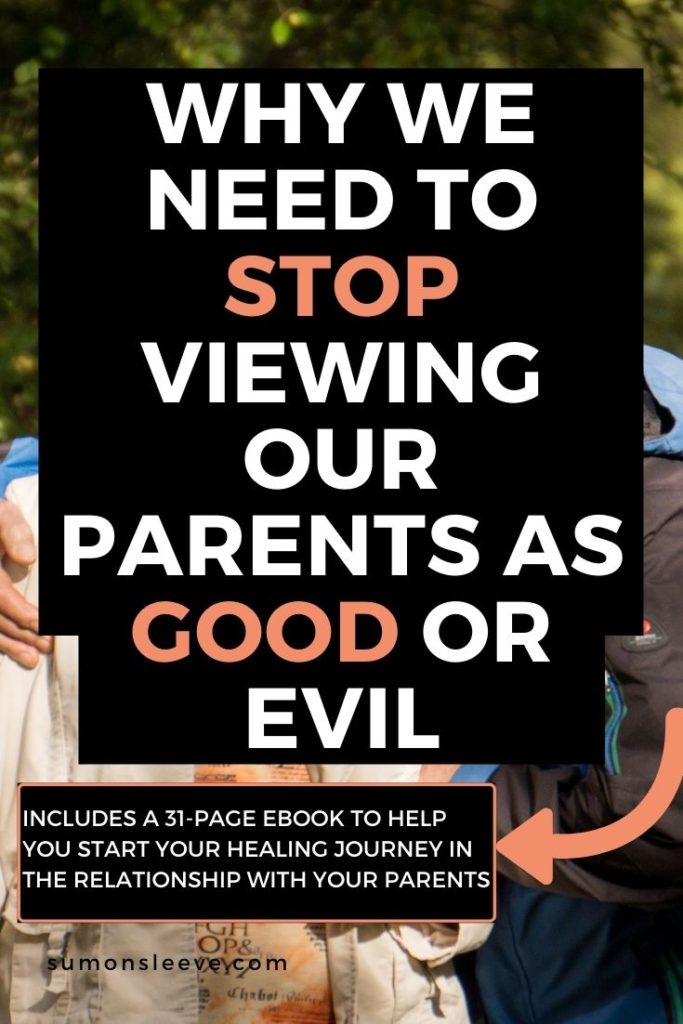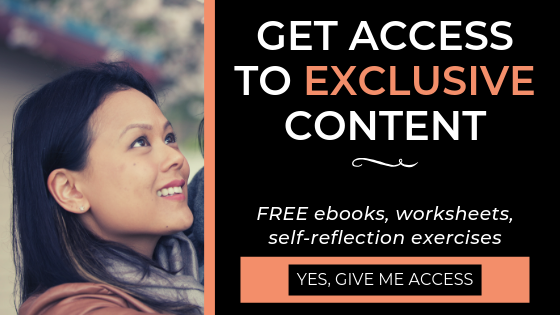Parents are not good or evil, heroes or villains. Seeing them as humans let us practice empathy and compassion for others and ourselves.

“Respect your parents! They did so much for you.”
As the author of the book “How To Deal With Asian Parents”, it’s obvious I’ve struggled with the relationship I have with my parents.
With that, folks often send me comments and advice about how I should respect my parents, asking me how I would feel if they died, assuming that I wrote the book as a way to complain and vent about how horrible they are.
Some have even gone as far as asking me,
“How do you feel when your children see this? You know, what goes around, comes around? Taste of your own medicine…”
“Your parents should be embarrassed and ashamed of you.”
Damned if you do and damned if you don’t
On the flip side, I’ve also received a few comments about how my book is a lost cause, that it’s impossible to deal with Asian parents and that my efforts are futile. Comments like these have ranged from,
“I don’t want to deal with them. They’re horrible people. They’ll never change.”
“What’s the point of this book? I’ve given up on them and you should too!”
“Stop opening old wounds that won’t heal. You’ve wasted your time.”
Solutions, not problems
I’m a person who values walking the talk so as the book title infers, it’s about how to deal with an issue, not about how to define it.
In reality, I spend a lot of time with my parents, seeing them at least 3 times a week and having family dinner together regularly. They take care of my daughter during the week so that I am able to work and write. Watching them help me raise her has allowed me to gain insight into why they are the way they are, appreciating their strengths and empathizing with their limitations.
It can be quite the effort but through the trials and tribulations of my journey in improving my relationship with them, I’ve realized the effort is worth it because I was able to get what I put in. I wouldn’t write a book about problems without offering solutions.
Those who believe people are either good or evil
Although both of these opinions are as different as night and day, they stem from a similar belief: humans are either good or evil.
Suppressing pain and enabling bad behaviour
Those who scold me for highlighting the issues between immigrant parents and their children idealize the parenting role. They believe parents are entitled to unconditional loyalty and devotion from their offspring, regardless of how they treated them.
Negative criticism cannot be shared about how a parent raised their children because the parenting role is a position of absolute power and authority. Parents are inherently “good”; children need to love their parents and should want them around.
“Oh just let it go. She’s just like that.”
“Don’t bring it up! It’ll hurt his feelings.”
“She’s so old already, just give her this one. Let bygones be bygones.”
“He’s your father, he did so much for you. Your need to stand down and don’t say anything bad about him.”
Whether we succumb to those (like other family members) who pressure us to stay silent or we say these things to ourselves, sweeping our emotions under the rug and turning a blind eye to bad behaviour only hurts us in the end.
The role of a parent does not give them immunity to having consequences for their actions. Yes, parents want the best for their children but good intentions do not justify toxic behaviour. It doesn’t mean they can say or do whatever they want to their children.
When someone has always been enabled for their wrongdoing, they do not understand they have done any wrong; they may not be aware that they’ve hurt another person. When confronted, they may not fully understand why and how what they’ve said or done would upset another person because they’ve been conditioned to believe that their behaviour is acceptable.
However, even if all they can do is listen, expressing our emotions appropriately allows us to face our true feelings, heal, feel better and live authentically.
Letting pain manifest and holding a grudge
Those who criticize me for offering solutions rather than laying blame believe those who have done wrong to us will always do wrong. Grudges are held tightly around their hearts. The wrongdoers are the villains and we are the victims. Those who hurt us should never be forgiven as they are inherently “evil”. They are put in a box and that’s where they stay.
When someone hurts us, we get angry. But if we don’t express our emotions appropriately, try to empathize with them, forgive and let go, we begin to hold a grudge, resenting them, hating them to the core. The pain manifests into a blaming mindset and we despise everything that is associated with this person.
Does that mean everything they say or do is wrong?
Is a person’s life defined by how they treated us? Their mistakes? Their regrets? The bad days? The bad years?
No. They are not always greedy. They are not always selfish. They are not always jealous. They are not always spiteful. They are not always toxic. They are not always narcissistic. They are not always horrible people.
Toxic parents are toxic for a reason. An individual as a whole is greater than the sum of their parts. Instead of laying blame and digging a hole of resentment, healing begins by taking the time to understand those parts, the factors the shaped their harmful behaviour.
Cutting ties may be the only option for some
When dealing with interpersonal relationships, a lot of it comes down to making peace with ourselves, healing from trauma and moving forward. Rather than focusing on changing the other person which is not within our control, the work is about self-acceptance, coping mechanisms and growth. And sometimes severing the parent-child relationship is the only option.
I know many who are constantly verbally and emotionally abused by their parents and have set boundaries. Their influence had become toxic and detrimental to their own mental health and I am fully supportive of cutting ties and/or limiting contact; however, it’s not a decision that can be taken lightly.
What “respect your parents” means to me
Respect your parents doesn’t mean obey without question, with absolute loyalty, letting them abuse their power, always siding with them no matter what.
Respect your parents means having respectful and honest conversations about our feelings, sharing details about our lives, helping them out with things they need help with (within reason), talking openly about our past and experiences, and freely and safely speaking up and out when we are hurt.
Speaking up about how someone made us feel doesn’t make us disrespectful. It means we are trying to be vulnerable and we want a better relationship with the other person; the desire to resolve issues is a sign of respect.
Getting realistic about my parents
I neither idealize nor demonize my parents. I see them for who they are, imperfect people. In terms of personality, values and beliefs, I gel with my mom more than my dad. I would choose to be friends with my mom but not my dad.
Growing up, my dad was the breadwinner; he worked a lot and was often in a grumpy mood. He has said some hurtful things to me and he rarely took the opportunity to get to know me. He doesn’t like to be challenged or questioned.
However, although I don’t get along with my dad, it doesn’t mean I disagree with everything he says and does. Despite our past, there are moments where I think he’s right. When others say negative things about him, it doesn’t mean I mindlessly agree. I weigh their opinions against the truth of what I know and defend him if need be.
It’s about taking the time to be objective and seeing him as a whole person, not only his role as a father to me. Just because he wasn’t who I wanted him to be when I was a child doesn’t mean he is a villain for the rest of my life.
My mom was my primary caregiver. She was the one who drove me to my piano lessons, picked me up from basketball practice, took me shopping for back to school clothes. She actually listened when I told her about my problems. She didn’t make me feel like a child or belittle me when we talked. She respected my opinions, made me feel safe when I challenged her and empowered me to be myself.
I get along with my mom but I don’t put her on a pedestal. I don’t agree with everything she says and does. And I don’t always do what she tells me to do just because she was the ‘good’ parent, the one who did ‘everything’ for me.
I don’t come to her defence immediately if someone says a negative thing about her. She has flaws. She makes mistakes. She is human. She isn’t always right.
Besides, I wouldn’t want her to be perfect as that would make me feel inadequate as a mother.
How we see others reflects how we see ourselves
I don’t want to view my parents as superheroes or villains because I don’t want to set that as an expectation for myself, my husband and my kids. I am flawed but I try my best given my limitations. Some days, I feel like I’m at the top of my game and on other days, I’m barely holding on. I want my kids to understand and appreciate that.
At the end of the day, when we see the world as black or white, people as good or evil, that’s how we see ourselves. One regret or mistake that we make doesn’t dictate how the rest of our life plays out. Turning a blind eye and giving excuses for our poor behaviour doesn’t mean hurtful words and actions don’t have consequences.
When we remove those rose and jade coloured glasses, it allows us to see our parents as they are; understanding their reasons and limitations allow us to practice empathy and compassion not just for others but for ourselves.





